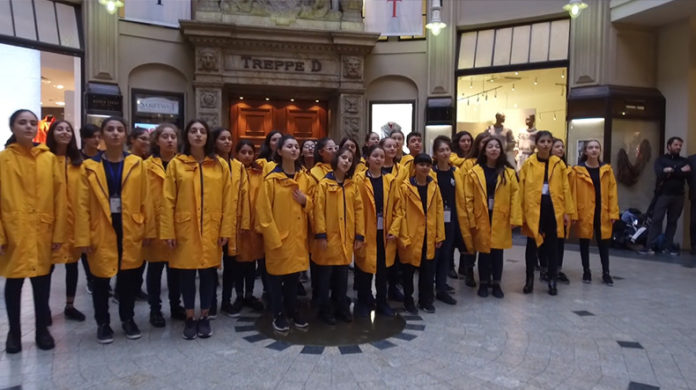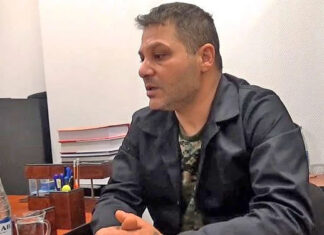BERLIN — It was the 28th anniversary of independence for the Republic of Armenia and the 150th birthday of national composer and musician Komitas Vardapet. To celebrate, the Little Singers of Armenia, a world class children’s choir, travelled to Lithuania and Germany, performing in some of Europe’s most famous concert halls. In Lithuania they appeared at the 700-year-old castle on Trakai island, at the Church of St. Francis in Kaunas and in the Culture House in Vilnius. The church of St. Catherine in Vilnius hosted a gala concert, attended by representatives of the diplomatic corps, statesmen and cultural figures. At the conclusion, they joined with the Lithuanian choirs Azholukas and Ugniale to perform Erebuni-Yerevan composed by E. Hovhannisyan.
On September 25, they were at the center of national day celebrations in Berlin, hosted by Ambassador Ashot Smbatyan. Performing in the Berlin Concert House, they offered classical music by Armenian and foreign composers, with Komitas at the center. And on September 29, they sang in the Gewandhaus concert hall in historic Leipzig, followed by an appearance in Halle. (In Leipzig, they also staged a flash mob on September 28 in the Mädler Passage trade center, singing Armenian national songs.)
Founded in 1992, the Little Singers of Armenia are, in the words of Smbatyan, “the cultural ambassadors of Armenia who have their special role in our rich cultural heritage.” The youngsters, between the ages of 11 and 16, represent a new generation, he said; born during these years of independence, they guarantee a bright future for the country.
Michael Roth, Minister of State at the German Federal Foreign Office, opened the gala concert with a speech highlighting the role of culture in German-Armenian relations. Speaking on behalf of the German government, he delivered his “sincere congratulations to all Armenians” on the anniversary. He quoted an Armenian proverb, to the effect that “mountains do not provide mutual support, but people do. And just as individuals lean and rely on each other, entire societies do the exact same thing.” Citing this proverb as a “fitting reflection” of relations between Germany and Armenia, he expressed his gratitude for the cooperation that has grown over the past 27 years, “based not only on the commitment of our governments and politicians but, above all, on the effort of our civil societies, academia, cultural sectors and business communities.” This includes German development cooperation as well.
Germans followed the Velvet Revolution, he said, “with great interest and admiration for the peaceful campaign conducted by a vibrant and diverse civil society.” The political dialogue between Berlin and Yerevan then grew in intensity, as marked by Chancellor Angela Merkel’s visit to Armenia in August 2018 and the visits to Berlin by the Armenian President and Prime Minister, in November 2018 and February 2019, respectively.
Although Germany is committed to developing this relationship, Roth said, “political dialogue alone is not enough. Culture, education and academia are key pillars of our bilateral relations.” Here he pointed to the Goethe-Zentrum in Yerevan as a “popular showcase” for Germany, its language and culture. In its Cultural Preservation Program, the center has funded a project to document prehistoric petroglyphs as well as to restore and digitize manuscripts in the Matenadaran.








